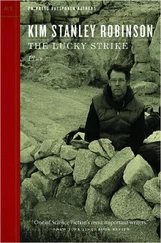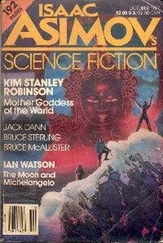So I enjoyed it. It’s a beautiful game even when you’re butchering it. My sorest muscles after practice were in my stomach from laughing so hard. I even began to have some success at short. When I caught balls going to my right I twirled around backward to throw to first or second. People were impressed though of course it was ridiculous. It was a case of the one-eyed man in the country of the blind. Not that they weren’t good athletes, you understand, but none of them had played as kids, and so they had no baseball instincts. They just liked to play. And I could see why—out there on a green field as big as the world, under a purple sky, with the yellow-green balls flying around—it was beautiful. We had a good time.
I started to give a few tips to Gregor too, though I had sworn to myself not to get into coaching. I don’t like trying to tell people what to do. The game’s too hard for that. But I’d be hitting flies to the outfielders, and it was hard not to tell them to watch the ball and run under it and then put the glove up and catch it, rather than run all the way with their arms stuck up like the Statue of Liberty’s. Or when they took turns hitting flies (it’s harder than it looks) giving them batting tips. And Gregor and I played catch all the time during warm-ups, so just watching me—and trying to throw to such a short target—he got better. He definitely threw hard. And I saw there was a whole lot of movement in his throws. They’d come tailing in to me every which way, no surprise given how loose-wristed he was. I had to look sharp or I’d miss. He was out of control, but he had potential.
And the truth was, our pitchers were bad. I loved the guys, but they couldn’t throw strikes if you paid them. They’d regularly walk ten or twenty batters every game, and these were five-inning games. Werner would watch Thomas walk ten, then he’d take over in relief and walk ten more himself. Sometimes they’d go through this twice. Gregor and I would stand there while the other team’s runners walked by as in a parade, or a line at the grocery store. When Werner went to the mound I’d stand by Gregor and say, You know, Gregor, you could pitch better than these guys. You’ve got a good arm. And he would look at me horrified, muttering, No no no no, not possible.
But then one time warming up he broke off a really mean curve and I caught it on my wrist. While I was rubbing it down I walked over to him. Did you see the way that ball curved? I said.
Yes, he said, looking away. I’m sorry.
Don’t be sorry. That’s called a curveball, Gregor. It can be a useful throw. You twisted your hand at the last moment and the ball came over the top of it, like this, see? Here, try it again.
So we slowly got into it. I was all-state in Connecticut my senior year in high school, and it was all from throwing junk—curve, slider, split-finger, change. I could see Gregor throwing most of those just by accident, but to keep from confusing him I just worked on a straight curve. I told him, Just throw it to me like you did that first time.
I thought you weren’t to coach us, he said.
I’m not coaching you! Just throw it like that. Then in the games throw it straight. As straight as possible.
He mumbled a bit at me in Moravian, and didn’t look me in the eye. But he did it. And after a while he worked up a good curve. Of course the thinner air on Mars meant there was little for the balls to bite on. But I noticed that the blue-dot balls they played with had higher stitching than the red-dot balls. They played with both of them as if there was no difference, but there was. So I filed that away and kept working with Gregor.
We practiced a lot. I showed him how to throw from the stretch, figuring that a windup from Gregor was likely to end up in knots. And by mid-season he threw a mean curve from the stretch. We had not mentioned it to anyone else. He was wild with it, but it hooked hard; I had to be really sharp to catch some of them. It made me better at shortstop too. Although finally in one game, behind 20-0 as usual, a batter hit a towering pop fly and I took off running back on it, and the wind kept carrying it and I kept following it, until when I got it I was out there sprawled between our startled center fielders.
Maybe you should play outfield, Werner said.
I said, Thank God.
So after that I played left-center or right-center, and I spent the games chasing line drives to the fence and throwing them back in to the cutoff man. Or more likely, standing there and watching the other team take their walks. I called in my usual chatter, and only then did I notice that no one on Mars ever yelled anything at these games. It was like playing in a league of deaf-mutes. I had to provide the chatter for the whole team from two hundred yards away in center field, including of course criticism of the plate umpire’s calls. My view of the plate was miniaturized but I still did a better job than they did, and they knew it too. It was fun. People would walk by and say, Hey there must be an American out there.
One day after one of our home losses, 28-12 I think it was, everyone went to get something to eat, and Gregor was just standing there looking off into the distance. You want to come along? I asked him, gesturing after the others, but he shook his head. He had to get back home and work. I was going back to work myself, so I walked with him into town, a place like you’d see in the Texas panhandle. I stopped outside his co-op, which was a big house or little apartment complex, I could never tell which was which on Mars. There he stood like a lamppost, and I was about to leave when an old woman came out and invited me in. Gregor had told her about me, she said in stiff English. So I was introduced to the people in the kitchen there, most of them incredibly tall. Gregor seemed really embarrassed, he didn’t want me to be there, so I left as soon as I could get away. The old woman had a husband, and they seemed like Gregor’s grandparents. There was a young girl there too, about his age, looking at both of us like a hawk. Gregor never met her eye.
Next time at practice, I said, Gregor, were those your grandparents?
Like my grandparents.
And that girl, who was she?
No answer.
Like a cousin or something?
Yes.
Gregor, what about your parents? Where are they?
He just shrugged and started throwing me the ball.
I got the impression they lived in another branch of his co-op somewhere else, but I never found out for sure. A lot of what I saw on Mars I liked—the way they run their businesses together in co-ops takes a lot of pressure off them, and they live pretty relaxed lives compared to us on Earth. But some of their parenting systems—kids brought up by groups, or by one parent, or whatever—I wasn’t so sure about those. It makes for problems if you ask me. Bunch of teenage boys ready to slug somebody. Maybe that happens no matter what you do.
Anyway we finally got to the end of the season, and I was going to go back to Earth after it. Our team’s record was three and fifteen, and we came in in last place in the regular-season standings. But they held a final weekend tournament for all the teams in the Argyre Basin, a bunch of three-inning games, as there were a lot to get through. Immediately we lost the first game and were in the loser’s bracket. Then we were losing the next one too, and all because of walks, mostly. Werner relieved Thomas for a time, then when that didn’t work out Thomas went back to the mound to rerelieve Werner. When that happened I ran all the way in from center to join them on the mound. I said, Look you guys, let Gregor pitch.
Gregor! they both said. No way!
He’ll be even worse than us, Werner said.
How could he be? I said. You guys just walked eleven batters in a row. Night will fall before Gregor could do that.
Читать дальше
Конец ознакомительного отрывка
Купить книгу












